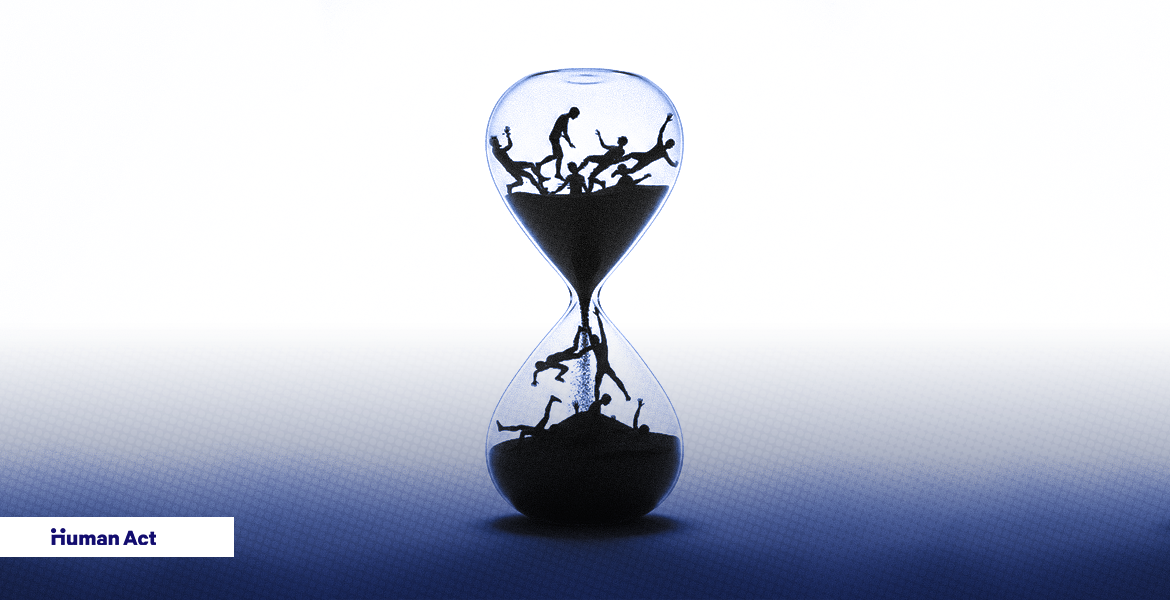


You are not poor because you do not have a job, but because you do not have time (to live!).
Five in the morning, an alarm cuts through the dark room. Someone drags themselves out of bed, gets dressed, skips breakfast, and rushes out the door.
They will work until evening, exhausted, they pick up groceries, care for their kids, clean the house, and maybe, just maybe, sit down for a few minutes before midnight.
Are they poor? Maybe not by their bank account. But by another measure, their time, they are deeply impoverished.
We often think of poverty as a lack of money. But there is another hidden form of deprivation spreading quietly across the world, we call it time poverty, and it may be the most invisible and cruel of all.
It takes over your life, your dreams, and hopes that someday in the past you had for yourself.
Time poverty means not having enough time for rest, learning, personal development or simply living.
Because all your hours are consumed by survival, and you put all your effort into other people’s dreams.
You may have a job, an income, even a degree. But if your every waking moment is spent working, commuting, or caring for others, you are not truly living, you are just maintaining existence.
Time poverty is a structural issue, born from an economy that forces people to sell their hours just to stay afloat. In today’s world, time itself has become a commodity, and only the wealthy can afford to buy it back.
When one job is not enough to cover the cost of living, many people are forced to take a second job just to keep up with daily expenses.
Women, especially in low-income countries, carry the heaviest time burden. According to the United Nations, women spend four to five more hours per day on unpaid labor, cooking, cleaning, childcare, elder care.
These hours do not show up in GDP statistics, but they are real, exhausting work. This usually causes a person to fall behind global developments. In other words, it gradually halts personal growth and progress.
Without affordable childcare, efficient transport, or reliable healthcare, the poor lose time on every front. They wait in longer lines, commute farther, and handle everything themselves. In short, financial poverty eats away at time.
The consequences of time poverty go far beyond exhaustion or sleep deprivation. Let’s take a closer look.
Long working hours and constant pressure lead to fatigue, depression, and cardiovascular disease.
When every day is survival mode, there is no energy left for empathy, friendship, or love. Families drift apart, because there is simply no time to connect.
The wealthy can “buy time.” They outsource chores, hire nannies, order food, use faster transport. The poor must do everything themselves. While one person spends their free hour learning a new skill, the other spends it waiting for a bus.
Time poverty quietly turns money inequality into social inequality.
In today’s world, time is the truest currency. The rich accumulate it. The poor lose it.
Think about it: a wealthy person can pay for convenience, express delivery, a private driver, digital assistants, even “digital detox” retreats to escape the chaos. Meanwhile, those living paycheck to paycheck are trapped in an endless loop.
Technology, ironically, makes this divide wider.
High-speed internet, smart services, and automation save time, for those who can afford them. For the rest, slow systems, bureaucracy, and unreliable infrastructure eat away the hours.
In the 21st century, inequality is not just about income, it is about how much of your day truly belongs to you.
The United Nations Development Programme (UNDP) has called time poverty a global crisis in disguise.
In developing countries, it is up to three times more severe than in richer ones. But even in wealthy societies, the middle class is now joining the ranks of the time poor.
Digital life, remote work, and the culture of “always being available” have blurred the line between work and rest. We’re connected 24/7, and that connection has a cost.
As a Harvard researcher put it:
“Modern humans have built more tools for convenience than ever before, and somehow ended up with no time left to rest.”
It is hard, but not impossible. Because time poverty is not just a personal choice, It is a policy failure. Governments can reduce time poverty by investing in the following areas:
Companies also have a role to play. They can create fair, flexible, and human-centered workplaces, and reward productivity, not busyness.
On a personal level, you can:
Perhaps the cruelest part of time poverty is that we spend our lives building the dreams of people who will never help us reach our own.
We wake up early to work for companies where the profit goes elsewhere, spend our days in traffic, queues, and endless meetings just to keep the “wheels of the economy” turning.
In a world where inequality controls time itself, many of us have become workers who sell the years of their lives. And in return, we receive only a small fragment of a larger dream that was never ours.
We speak of financial independence, but what we truly crave is freedom over our time, the right to own our days and decide which dreams are worth our hours.
In a world that never stops moving, many of us forget to walk our own path.
Forbes / Harvard Business School / Hampton / NIH
"*" indicates required fields